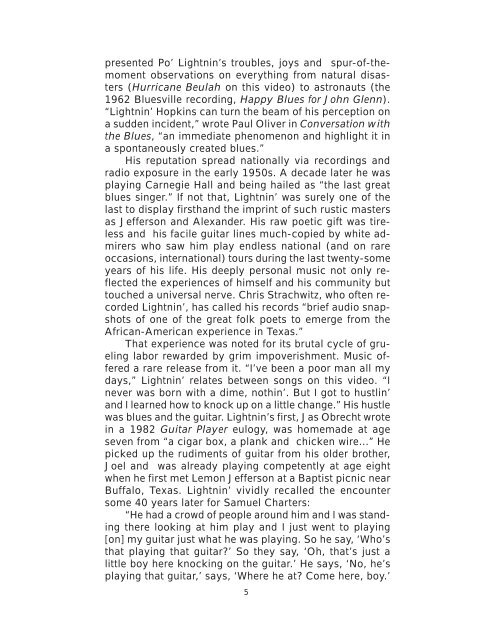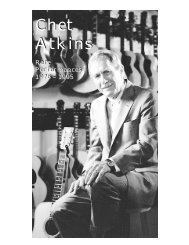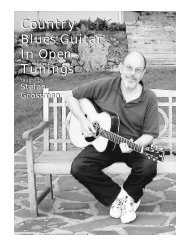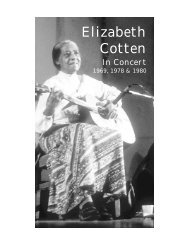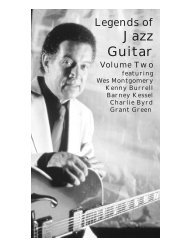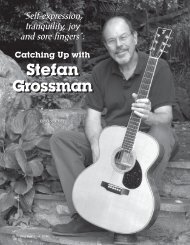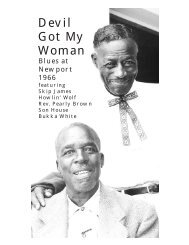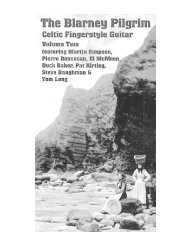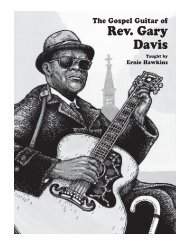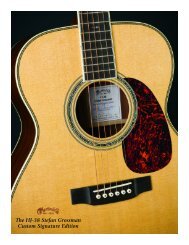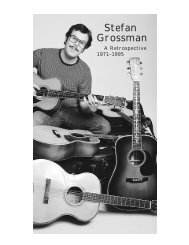Lightnin' Hopkins - Stefan Grossman's Guitar Workshop
Lightnin' Hopkins - Stefan Grossman's Guitar Workshop
Lightnin' Hopkins - Stefan Grossman's Guitar Workshop
Create successful ePaper yourself
Turn your PDF publications into a flip-book with our unique Google optimized e-Paper software.
presented Po’ Lightnin’s troubles, joys and spur-of-themoment<br />
observations on everything from natural disasters<br />
(Hurricane Beulah on this video) to astronauts (the<br />
1962 Bluesville recording, Happy Blues for John Glenn).<br />
“Lightnin’ <strong>Hopkins</strong> can turn the beam of his perception on<br />
a sudden incident,” wrote Paul Oliver in Conversation with<br />
the Blues, “an immediate phenomenon and highlight it in<br />
a spontaneously created blues.”<br />
His reputation spread nationally via recordings and<br />
radio exposure in the early 1950s. A decade later he was<br />
playing Carnegie Hall and being hailed as “the last great<br />
blues singer.” If not that, Lightnin’ was surely one of the<br />
last to display firsthand the imprint of such rustic masters<br />
as Jefferson and Alexander. His raw poetic gift was tireless<br />
and his facile guitar lines much-copied by white admirers<br />
who saw him play endless national (and on rare<br />
occasions, international) tours during the last twenty-some<br />
years of his life. His deeply personal music not only reflected<br />
the experiences of himself and his community but<br />
touched a universal nerve. Chris Strachwitz, who often recorded<br />
Lightnin’, has called his records “brief audio snapshots<br />
of one of the great folk poets to emerge from the<br />
African-American experience in Texas.”<br />
That experience was noted for its brutal cycle of grueling<br />
labor rewarded by grim impoverishment. Music offered<br />
a rare release from it. “I’ve been a poor man all my<br />
days,” Lightnin’ relates between songs on this video. “I<br />
never was born with a dime, nothin’. But I got to hustlin’<br />
and I learned how to knock up on a little change.” His hustle<br />
was blues and the guitar. Lightnin’s first, Jas Obrecht wrote<br />
in a 1982 <strong>Guitar</strong> Player eulogy, was homemade at age<br />
seven from “a cigar box, a plank and chicken wire...” He<br />
picked up the rudiments of guitar from his older brother,<br />
Joel and was already playing competently at age eight<br />
when he first met Lemon Jefferson at a Baptist picnic near<br />
Buffalo, Texas. Lightnin’ vividly recalled the encounter<br />
some 40 years later for Samuel Charters:<br />
“He had a crowd of people around him and I was standing<br />
there looking at him play and I just went to playing<br />
[on] my guitar just what he was playing. So he say, ‘Who’s<br />
that playing that guitar?’ So they say, ‘Oh, that’s just a<br />
little boy here knocking on the guitar.’ He says, ‘No, he’s<br />
playing that guitar,’ says, ‘Where he at? Come here, boy.’<br />
5


